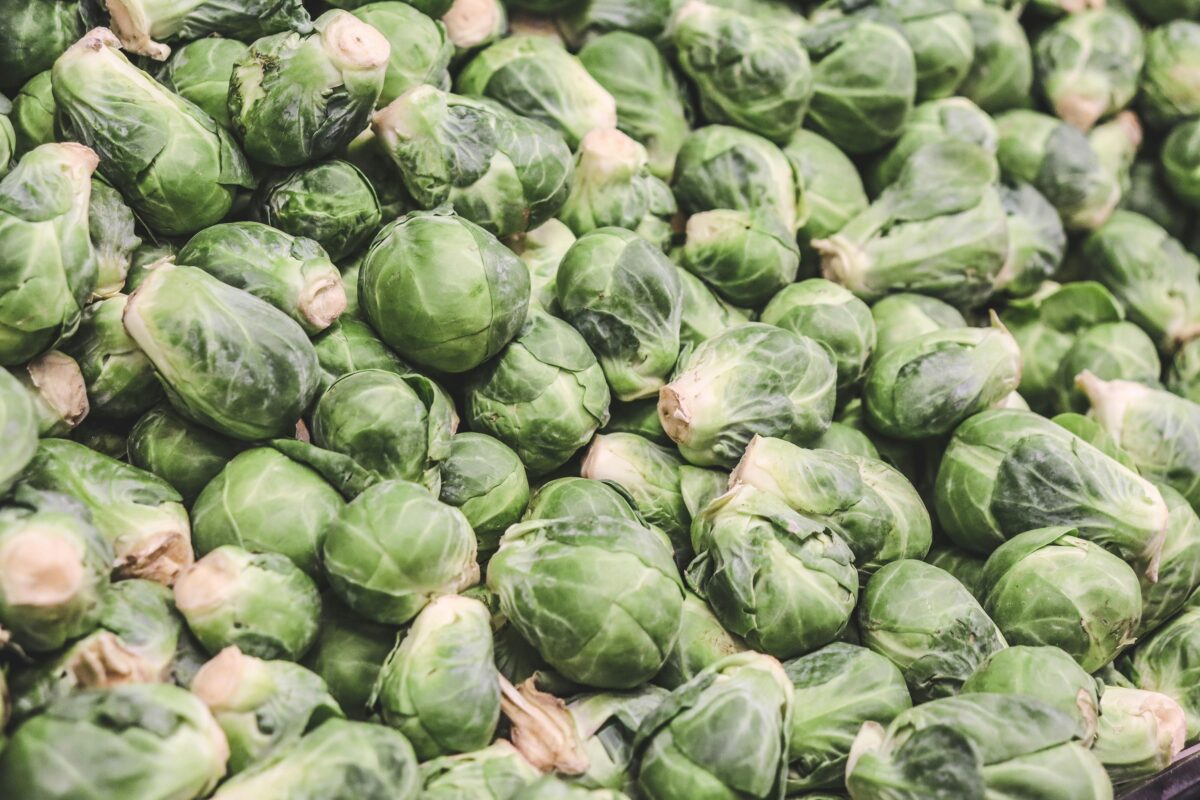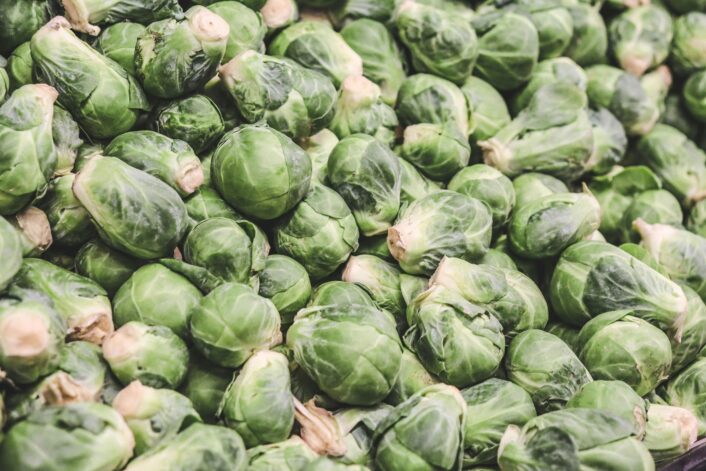The Genetics of Brussels Sprouts Liking
harvey
on
April 25, 2024

Latest Posts
Table of Contents
The Genetics of Brussels Sprouts Liking
Date of Content: April 10, 2024
Written by: Harvey Talento
Reviewed by: Maarit Tiirikainen, PhD
Brussels sprouts. The mere mention of their name can cause grimaces or cravings, depending on who’s asked. These miniature cabbages have a reputation for dividing people’s opinions, but what if there’s more to their story?
Let’s get into the world of Brussels sprouts and explore why some love them and others don’t.

Nutritional Value of Brussels Sprouts
Brussels sprouts aren’t just delicious (once cooked properly), they’re also packed with nutrients that benefit the body in numerous ways:
High in Fiber: Brussels sprouts are a great source of fiber, which keeps one feeling full for longer, aids digestion, and promotes gut wellness.
Vitamin Powerhouse: They’re brimming with essential vitamins, particularly vitamins C and K. Vitamin C is crucial for immune function, collagen production, and iron absorption. Vitamin K is vital for blood clotting and bone health.
Antioxidant Advantage: Brussels sprouts are rich in antioxidants, which combat free radicals in the body and may help reduce the risk of chronic diseases like heart disease and cancer.
Why Are Some People Inclined to Brussels Sprouts Liking?
Genetic Influences
There’s a genetic component to Brussels sprouts liking. Human taste buds have receptors for bitterness, and some people have a higher sensitivity thanks to a gene variation. This can make the bitter compounds in Brussels sprouts particularly unpleasant for those who have sensitive taste reception.
A large-scale 2022 GWAS study of food liking identified 1,401 significant food-liking associations which showed substantial agreement in the direction of effects with 11 independent cohorts.
The study used genetic correlations combined with genomic structural equation modeling to create a multi-level map of the relationships between different food preferences, highlighting three main domains that they define as “Highly palatable”; including desserts, meat, and savory foods, “Low caloric”; including vegetables, fruit, and whole grains, and “Acquired” foods including unsweetened coffee, alcohol, cheese, and strong-tasting vegetables.
LifeDNA references this study to analyze specific genes in order to provide personalized insights into Brussels sprouts liking. Genes with genetic variants associated with Brussels sprouts liking include SLC39A8, BNC2, BTBD11, and NCAM1.
Genetic factors have been found to correlate with various aspects of food preferences and could affect liking for food through different pathways related to brain development, energy use, and how we experience rewards. Understanding the role of genetic variation in food preferences could shed light on the genetic and neurological roots of food preferences and decisions, essential for developing more effective dietary plans and creating more appealing food options.
Non-Genetic Factors
Aside from genetics, there are several other factors that can influence Brussels sprouts liking.
- Age of Exposure: Children, especially picky eaters, maybe more averse to the strong flavors of Brussels sprouts. Repeated exposure over time can lead to a greater appreciation for the vegetable.
- Learned Association: Negative experiences with Brussels sprouts in the past, especially if they were overcooked or poorly prepared, can influence someone’s present-day feelings about them.
- Cultural Influence: Some cultures incorporate Brussels sprouts more heavily into their cuisine than others. This familiarity can lead to a greater liking.
- Taste and Aroma: Brussels sprouts contain sulfurous compounds that can taste bitter or cabbage-like to some people. Genetics can play a role in how strongly someone perceives this bitterness. Cooking methods can also affect the taste. Overcooked sprouts can be mushy and release more of these bitter compounds.
In conclusion, a combination of biology, experience, and cultural factors determines how someone feels about this little green vegetable.
Tips for Preparing Brussels Sprouts
Maybe not everyone will become inclined to Brussels sprouts liking. But with a little openness and some delicious recipes, people might just discover a newfound appreciation for these tiny green powerhouses. Here are some tips on preparing Brussels sprouts:
- Freshness is key. Look for firm, bright green sprouts with no yellowing.
- Don’t overcook them. Aim for tender-crisp, not mushy.
- Embrace variety. Try roasting with bacon and balsamic glaze, or pan-frying with garlic and chili flakes.
- Start small. Add a few roasted Brussels sprouts to one’s next meal and see if they enjoy them.
The Brussels Sprouts Redemption
Brussels sprouts have transformed. Modern varieties are milder than their predecessors, thanks to selective breeding. And when it comes to cooking, there’s a whole world beyond boiling.
Roasting Brussels sprouts brings out their natural sweetness, caramelizing the outer leaves while keeping the interior tender. Pan-frying adds a delightful crispness. One can even shred them for a slaw or puree them into a creamy soup.
About the LifeDNA Nutrition Report
Discover a more vibrant you with the LifeDNA Nutrition Report, a personalized analysis of your DNA that offers tailored advice on nutrition based on your unique genetic makeup.
By understanding how your body reacts to and processes food, you can make smarter choices to reach your wellness goals and avoid potential health risks.
With practical recommendations and comprehensive insights into wellness beyond just food, the LifeDNA Nutrition report empowers you to take control of your well-being simply and effectively. Order your report today and take the first step towards a better you!
Summary
- Beyond the characteristic taste, Brussels sprouts pack a nutritional punch, offering fiber for digestion, vitamins C and K for immune function and bone health, and antioxidants for disease prevention.
- Genetics plays a role, with some individuals being more sensitive to bitter flavors due to genetic variations.
- Childhood experiences also shape preferences, as negative early encounters can deter future enjoyment.
- Freshness matters – choose firm, green sprouts and avoid overcooking. Experiment with roasting, pan-frying, or incorporating them into diverse dishes to discover new ways to enjoy their flavors.
- Brussels sprouts have evolved, with modern varieties milder and cooking methods more varied. Roasting, pan-frying, or using them in creative dishes can unveil their delicious potential, transforming skeptics into enthusiasts.
References
- https://www.iowafarmbureau.com/Article/Its-not-your-imagination-brussels-sprouts-do-taste-better-How-gene-editing-is-changing-how-we-grow-and-eat-food
- https://www.popsci.com/science/article/2012-03/fyi-why-do-kids-hate-brussels-sprouts/
- https://www.nature.com/articles/s41467-022-30187-w
Customer Reviews




*Understanding your genetics can offer valuable insights into your well-being, but it is not deterministic. Your traits can be influenced by the complex interplay involving nature, lifestyle, family history, and others.
Our reports have not been evaluated by the Food and Drug Administration. The contents on our website and our reports are for informational purposes only, and are not intended to diagnose any medical condition, replace the advice of a healthcare professional, or provide any medical advice, diagnosis, or treatment. Consult with a healthcare professional before making any major lifestyle changes or if you have any other concerns about your results. The testimonials featured may have used more than one LifeDNA or LifeDNA vendors’ product or reports.
- Category: Nutrition



